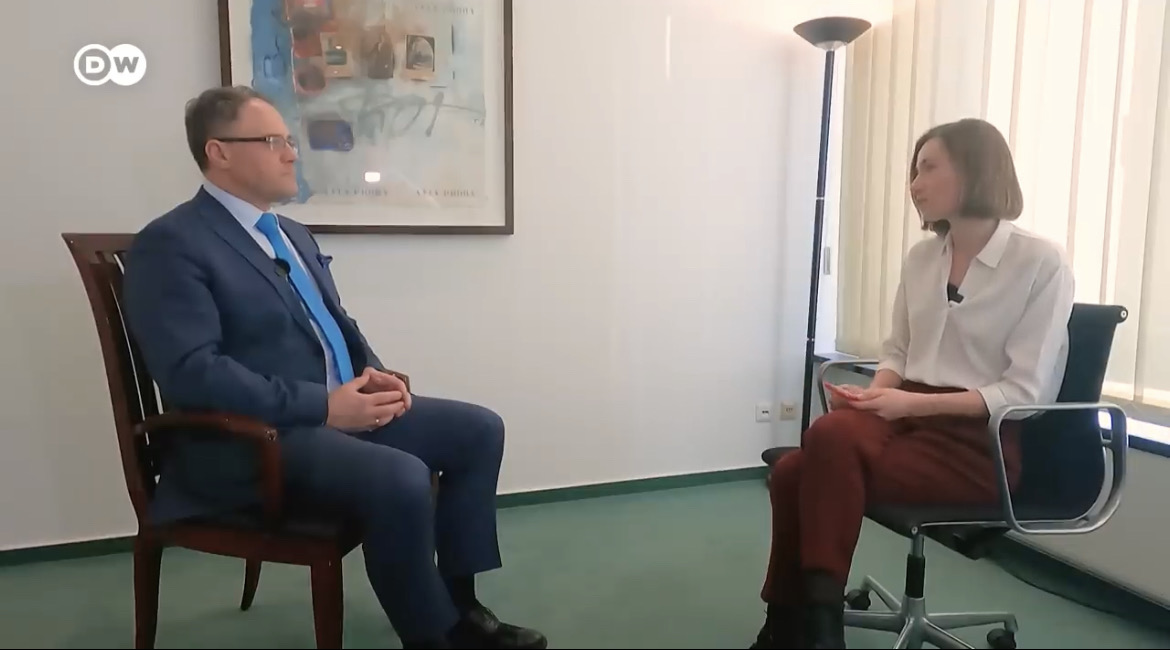ASTANA – The energy dialogue between Kazakhstan and Germany includes not only traditional but also alternative energy sources, Kazakh Deputy Minister of Foreign Affairs Roman Vassilenko said in an interview with German international broadcaster Deutsche Welle published on April 2.

Kazakh Deputy Minister of Foreign Affairs Roman Vassilenko during the interview with German international broadcaster Deutsche Welle published on April 2. Photo credit: Deutsche Welle.
Vassilenko paid a visit to Germany on March 27-28, where the Kazakh diplomat met his German counterparts for political consultations. According to officials, the parties discussed a range of topics focusing on strengthening bilateral cooperation in politics, economy and culture.
“According to German statistics, Kazakhstan is the third largest supplier of oil to Germany after Norway and the UK. The dialogue between Kazakhstan and Germany covers not only traditional sources of energy, but also new sources of energy. The German-Swedish consortium Svevind has signed a contract with Kazakhstan worth up to $30 billion to build solar and wind power plants with a capacity of 45 gigawatts to produce three million tons of green hydrogen per year, starting in 2030,” he said.
The official added Kazakhstan has the resources to increase production, whereas increasing the capacity of the transportation system will require investment and can take several years to implement.
Kazakhstan, according to Vassilenko, produces 90 million tons of oil per year, nearly 90 percent of which goes for export, almost all of it, to the European Union.
Earlier this year, the first shipment of Kazakh oil has also been exported to Germany via the Druzhba pipeline. However, the primary route for the transportation of Kazakh oil to Europe is the Caspian Pipeline Consortium (CPC), which largely runs through the territory of the Russian Federation, but is mainly owned by the biggest Western oil companies.
“We are interested in diversified sources of both oil supplies and oil supply routes. That is why it is important for us to maintain this route (CPC). Russia understands this and so do Western countries, which do not impose sanctions on transportation via this pipeline. But we also intend to develop alternative routes to have as many choices as possible,” added Vassilenko.
The diplomat also talked about the main vectors of Kazakhstan’s foreign policy and its position on the Russian conflict with Ukraine.
“We take neither a pro-Russian, nor a pro-American, nor a pro-Chinese position. Our position is pro-Kazakhstan, our foreign policy is based on our national interests,” Vassilenko said.
The foreign policy of Kazakhstan is multilateral, well-balanced, pragmatic and based on the commitment to the UN Charter and respect for the territorial integrity of all its members, including Ukraine, he said.
“All our partners know that,” he concluded.
Responding to questions, Vassilenko also explained the reasons behind the reinforcement of state migration policy as well as the enhancement of control over flow of the goods within the EAEU (Eurasian Economic Union) market.
“Kazakhstan, in general, does not view sanctions as the best way to solve contradictions between states. But at the same time, understanding the risks of secondary sanctions on Kazakh companies and based on our national interests, we have been taking actions over the past year to prevent the use of our territory to circumvent any sanctions,” Vassilenko said.
In his point of view, Kazakhstan is committed to the UN Charter and, as a country that has established strong and good relations with all its international partners, is sincerely interested in ending the Russian-Ukrainian conflict. “Military solutions are not sustainable options. We are not tired of talking about the importance of returning to a peaceful resolution of the conflict,” said Vassilenko, adding that Kazakhstan, if and when called upon, is ready to play a mediating role in that process.

